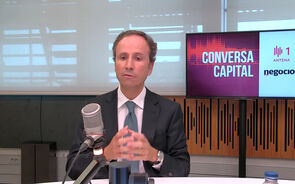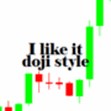Como perdi 100.000 no FOREX
4 mensagens
|Página 1 de 1
Bem, quando li o título, assustei-me - mas afinal, era só "demo money" 
É uma reportagem um pouco para o infeliz, pois o tipo diz que resolveu tentar contas demo antes de escrever sobre o crescimento do retail, no entanto conduziu aquilo com total despreocupação e sem qualquer acompanhamento (tipo verificar como iam os trades 1 vez por semana).
Com sorte, tinha era ganho 100.000!
É caso para dizer ao tipo para se afastar bem do Forex, pois conseguiu fazer o pior dos cenários mais comuns:
- Há os que ganham no demo e depois ganham no real;
- Há os que ganham no demo, mas depois perdem no real;
- Há os que perdem no demo... e esses não vale a pena passarem para o real, não há grande solução para eles!
É uma reportagem um pouco para o infeliz, pois o tipo diz que resolveu tentar contas demo antes de escrever sobre o crescimento do retail, no entanto conduziu aquilo com total despreocupação e sem qualquer acompanhamento (tipo verificar como iam os trades 1 vez por semana).
Com sorte, tinha era ganho 100.000!
É caso para dizer ao tipo para se afastar bem do Forex, pois conseguiu fazer o pior dos cenários mais comuns:
- Há os que ganham no demo e depois ganham no real;
- Há os que ganham no demo, mas depois perdem no real;
- Há os que perdem no demo... e esses não vale a pena passarem para o real, não há grande solução para eles!
Como perdi 100.000 no FOREX
Sept. 23, 2010, 12:02 a.m. EDT
A reporter’s first-hand experience
By Deborah Levine, MarketWatch
NEW YORK (MarketWatch) -- When I learned I’d be writing about the growth in retail currency trading, I figured it made sense to try it myself.
Luckily, it was only play money.
Many of the online sites serving the fast-rising demand for retail foreign-exchange trading offer free trial accounts to let novices gain experience before putting real money on the line.
I opened two trial accounts, one with FXCM and the other with Forex.com, figuring that after writing about foreign-exchange markets for a while, I could put on some trades based on what I know about the markets.
What I learned was that timing and risk management are fundamental to hanging on to your money — let alone booking any profits. Another key is the ability to stay engaged. Foreign-exchange markets operate 24 hours a day, and trading in them seems to be the antithesis of buy-and-hold stock investing.
I did know to put in stop-loss orders for all my positions, so if my bets went against me I didn’t just keep losing. That’s important to do. I wasn’t able to check my accounts very often, roughly every week. Most of the times I did check, my positions had hit those stops, saddling me with a big loss. If you can spend more time staring at the screen, you might be able to improve your profits, but I couldn’t do that.
Foreign-exchange markets have seen their appeal increase in recent years because the flavor of trading is similar to the boom times of day-trading during the dot-com era, albeit in a much larger market. See story on retail investors flocking to foreign-exchange trading.
But volatile trading presents the risk of abrupt market turns, and I instantly lost money, in part because of bad timing — one may think a currency will go down over time but if you take that position on a day it’s up, you lose money. That was a short-lived mistake.
Most people I talked to in my reporting indicated that they, and other traders, focus on the major currency pairs: U.S. dollar and the Japanese yen (U.S.:USDYEN) , the euro and the dollar (U.S.:EURUSD) , and the British pound and dollar. (REUTERS:USDGBP) . See slide show on foreign-exchange facts.
I also tried betting on the New Zealand (REUTERS:USDNZD) , Australian (REUTERS:USDAUD) and Canadian dollars (U.S.:USDCAD) , the co-called commodity currencies, which are expected to gain along with oil and gold. That didn’t work for me, either — again, because of the timing.
Both trading sites offered education in how their platforms work, how the market works, what terminology you need to know, and how to devise a strategy. They also featured tutorials and informational videos.
Currencies attract individuals
U.S. individual investors are increasingly drawn to foreign-exchange trading, the longtime domain of professional traders and their deeper pockets.
Many sites have information on understanding technical indicators and how other traders are positioned. Some offer forums for exchanging tips and ideas with other traders.
But as one of the customer-support representatives I spoke with acknowledged, becoming a professional-quality trader with a 30-day practice account is almost impossible. It takes more personalized training.
In one month of setting my own trades, I lost about $45,000.
I also tried a platform that allows individuals to piggyback on successful, professional traders. I started with $100,000 there, and split it between a few systems that seemed to be doing well. I ultimately lost $72,000 trying this method.
In the end, the only thing I had a gain on was gold (COMMODITIES:GCZ10) , which one site I tried lets you trade.
Given the continuing popularity of the precious metal as a hedge against paper assets, that’s probably not surprising.
Copyright © 2010 MarketWatch, Inc. All rights reserved.
Remember the Golden Rule: Those who have the gold make the rules.
***
"A soberania e o respeito de Portugal impõem que neste lugar se erga um Forte, e isso é obra e serviço dos homens de El-Rei nosso senhor e, como tal, por mais duro, por mais difícil e por mais trabalhoso que isso dê, (...) é serviço de Portugal. E tem que se cumprir."
***
"A soberania e o respeito de Portugal impõem que neste lugar se erga um Forte, e isso é obra e serviço dos homens de El-Rei nosso senhor e, como tal, por mais duro, por mais difícil e por mais trabalhoso que isso dê, (...) é serviço de Portugal. E tem que se cumprir."
4 mensagens
|Página 1 de 1
Quem está ligado:



